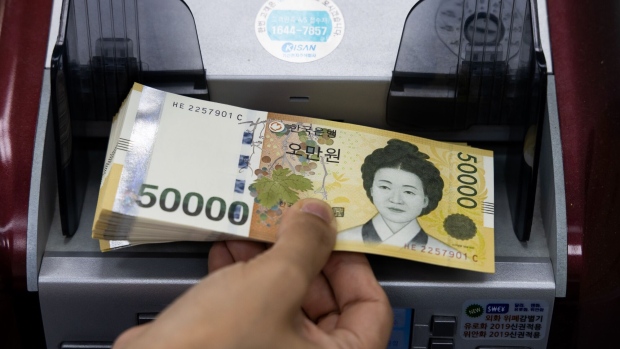Apr 16, 2024
South Korean Officials Ramp Up Warnings on Won Weakness
, Bloomberg News

(Bloomberg) -- South Korea discussed concerns about its currency with Japan after the won and yen slumped to multi-year lows this week amid a surge in the dollar that’s reverberating through global markets.
The government released a statement outlining comments from Finance Minister Choi Sang-mok and his Japanese counterpart Shunichi Suzuki in which they expressed “serious concerns” over the recent weakening of their currencies and warned of taking appropriate steps to counter any drastic volatility. There was no immediate comment from Japanese officials.
The won dropped to the key level of 1,400 versus the dollar on Tuesday for the first time since late 2022 while the yen set a fresh 34-year-low. Japanese officials have issued a steady stream of verbal warnings in recent months as the yen trades beyond levels that have previously brought authorities into the market to protect the currency.
Shortly after the statement, Bank of Korea Governor Rhee Chang-yong described recent moves in the won as a little excessive. “The central bank is ready to deploy stabilizing measures” and has enough resources to do so, Rhee said during an interview with CNBC. The yuan and yen’s weaknesses are also affecting the won, he added.
The won gained as much as 0.9% to 1,382.75 on Wednesday. The yen advanced about 0.1% to 154.60 versus the dollar at 3:31 p.m. Tokyo time. Most other currencies in the region remained under pressure Wednesday, with the Thai baht, Philippine peso and Indonesia rupiah among the worst performers in Asia on the day.
The Chinese yuan was little changed after its central bank kept it’s reference rate within its recent range in a bid to maintain currency stability.
“Looking at the current dollar-won level, the extent of actual intervention may not have been as strong as the verbal warnings,” said Park Sang-hyun, an economist at HI Investment & Securities in Seoul. “Markets could expect stronger interventions” should the won weaken again to beyond 1,400 per dollar, Park said.
South Korea makes regular forays into the foreign exchange market to smooth movements. Data shows that authorities stepped into markets in each of the 10 quarters up to the end of last year. The won still remains off its 13-year low of 1444.5 in October 2022.
Jawboning the Won: Decoding Comments by Korean Policymakers
The statement and comments by Rhee are the latest indication of the increasing frustration felt by policymakers in Asia as the strengthening dollar pummels currencies throughout the region.
The won’s slide on Tuesday prompted the finance ministry and central bank to issue a rare joint statement to warn against the currency’s weakness.
Concerns are also growing among some business leaders in Japan. Ken Kobayashi, the chairman of the Tokyo Chamber of Commerce and Industry, said he wants the government to consider coordination with other countries on forex intervention to stem the yen from further declining, Kyodo reported.
Japanese Executives Call for Government Steps to Bolster Yen
The won has weakened about 7% this year as robust US data softened expectations for the Federal Reserve to cut rates soon. The yen has depreciated about 9%, the most among Group-of-10 currencies.
Weakening economic momentum in China, Korea’s biggest trading partner, and concerns of capital outflows linked to a string of dividend payouts due in April, along with growing tensions in the Middle East, have also weighed on the currency.
Rhee’s remarks on currencies and the statement come before Choi and Suzuki are set to meet US Treasury Secretary Janet Yellen on Wednesday in Washington in a trilateral meeting. Before leaving for Washington, Suzuki told reporters that currency matters weren’t currently on the agenda for the Group-of-20 talks. If the topic comes up, he’ll thoroughly explain Japan’s position, he added.
A Trader’s Guide to Japanese Policymakers’ Language on the Yen
The yen has remained under pressure with market participants expecting the US-Japan interest rate gap to stay wide for longer.
Japanese authorities spent more than $60 billion in 2022 to intervene on three occasions arrest its slide toward 152 against the dollar. While the currency pair has now weakened beyond that mark, Tokyo has so far refrained from stepping back into markets, a move that would come under the spotlight when Suzuki is in Washington to meet his global peers.
International agreements call on nations to allow markets to determine exchange rates. Accords generally leave the door open to action against excessive movements in the market.
--With assistance from Shinhye Kang and Seyoon Kim.
(Updates won and yen prices, adds other currency moves in Asia, adds report on corporate concern over yen weakness.)
©2024 Bloomberg L.P.






